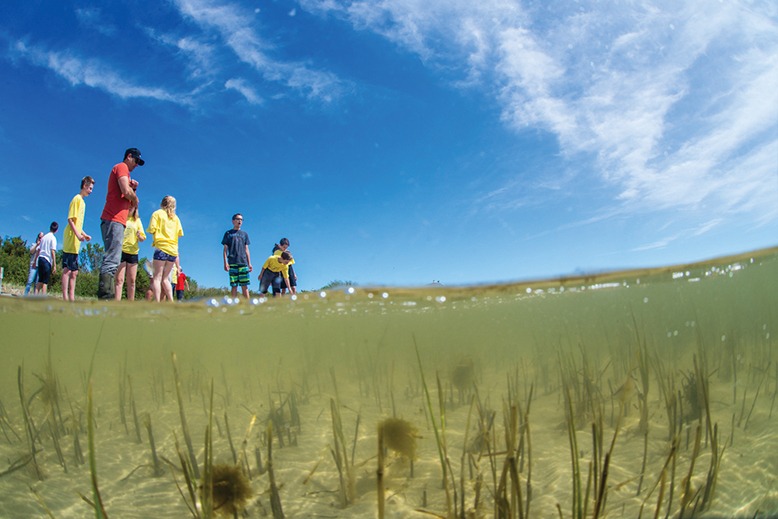
Students participating in ALO’s educational programming prepare to seine in Barnegat Bay. Courtesy of Alliance for a Living Ocean/Kyle Gronostajski
The story behind Alliance for a Living Ocean (ALO) starts in August 1987. Bon Jovi ruled the airwaves with “Livin’ on a Prayer,” Beverly Hills Cop II was the big summer blockbuster, and the beaches of Long Beach Island were closed for the rest of the season. For 8-year-old Casey Deacon, that meant summer was effectively over.
“It was pretty traumatic,” says Deacon, now the president of ALO. “My entire summer revolved around being in the ocean and being at the beach.” The culprit behind the closures was a 50-mile garbage slick off the coast, which had migrated from the Fresh Kills Landfill in Staten Island.
“It was trash in general, but it was also medical waste, which is particularly concerning,” explains ALO executive director Kyle Gronostajski. “It was a catalyst and got a lot of people interested,” including Ken Smith, Karen Kiss and John Woodland, who founded ALO that same year. “I can’t really say since that’s happened there have been too many beach closings because of trash.”
As environmental awareness has increased over the years, ALO has broadened its horizons. Today, Gronostajski describes ALO as a community organization. They help LBI in ways big (ALO served as the volunteer coordination arm for relief efforts after Hurricane Sandy) and small (Deacon rescued an abandoned, newborn river otter earlier this year).
[RELATED: Veterans Find Camaraderie, Calm in Fly Fishing]
ALO also organizes education and outreach programs on the island. Gronostajski is partial to critter roundups, a program for kids that involves dragging a net through the bay to find sea creatures to observe. Deacon, on the other hand, looks forward to beach cleanups.
“For me, it’s the most rewarding when you have someone do a cleanup for the first time,” says Deacon, who joined ALO three years ago. “They go out for an hour or two, and then they come back astonished at the amount of plastic that they’ve just picked up.”
Plastic waste remains one of ALO’s main issues, Gronostajski says. During the pandemic, ALO encouraged volunteers to conduct their own socially distanced beach cleanups. An unprecedented influx of off-season visitors to LBI increased the organization’s reach, and a few new board members joined the cause.
“A lot of people who have never spent any time here in the off-season were walking on the beach every day,” says Deacon.
Another upside of the pandemic was downtime. Last year’s lull in activity gave ALO the opportunity for a brand refresh, reflecting its broader mission.
Gronostajski is optimistic about the future of ALO. “There’s a lot of room for us to grow,” says Gronostajski. “I hope we can make LBI a cleaner place.”




